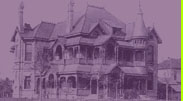WHO'S WHO - WILLIAM S. FARISH
 Without industry trailblazer William Stamps Farish, the legendary Humble Oil & Refining Co. of Houston and the oil industry as it is known today would have never taken shape.
Without industry trailblazer William Stamps Farish, the legendary Humble Oil & Refining Co. of Houston and the oil industry as it is known today would have never taken shape.
Farish was an informed decision-maker. He was a real student of the industry, seeking information from every level of the business, according to a 1967 Houston Chronicle article celebrating Humble’s 50th anniversary. The paper quoted one of his assistants as saying, "He wasn’t a driver, but he could lead a man almost to death, trying to keep up with him."
Farish was born in Mayersville, Mississippi, on February 23, 1881, the grandnephew of Jefferson Davis and son of William Stamps, a lawyer and planter, and Katherine (Power) Farish. He attended school at St. Thomas Hall, an Episcopal preparatory school at Holly Springs, Mississippi.
Farish earned his law degree at the University of Mississippi in 1900, he practiced law for three months at Clarksdale, Mississippi, before he traveled to Beaumont after the Spindletop discovery in 1901 to oversee one of his uncle’s oil investments. He became supervisor of wells for Texas Oil Fields, Limited, an English syndicate. The next year he organized the Brown-Farish Oil Company, which did contract drilling and traded in oil. The firm became bankrupt at Brown's death, but Farish succeeded in borrowing money to pay creditors. By 1904 Farish saw the potential of oil, and paired up with Robert Lee Blaffer, whom he’d met at a Beaumont rooming house, they formed a partnership to do contract drilling and lease trading, which became a successful drilling and lease trading business.
He married to Libbie Randon Rice in Houston on June 1, 1911, they had a son and a daughter.
The partners moved to Houston the next year, focusing on the Humble field and other oil ventures to the north. In 1915 Farish became president of the Gulf Coast Producers Association and subsequently was named president of the Texas-Louisiana Oil and Gas Association.
By 1916, Farish had become one of the leading independent oilmen in Texas but felt restrained because the independents by themselves were too small to sell directly to the refineries. He organized the small producers into the Gulf Coast Producers Association in 1916 but was unable to generate the large, steady flow of oil the refineries required. So Farish convinced Blaffer and independent oilmen Walter W Fondren, Ross S. Sterling, and Harry C. Wiess to pool their assets—wells, leases, equipment, production—into Humble Oil and Refining Company (later Exxon Company, U.S.A.) in March 1917 so that they would not have to rely on the major oil companies to move their product to market.
As vice president, Farish was in charge of production, advancing industry technology and helping the company expand rapidly. In 1918, he raised the profile of Humble, serving on the Petroleum Committee of the Council for National Defense. When Humble grew short of capital for expansion, Farish turned to industry executives he had met. He negotiated with Walter Teagle, head of Standard Oil of New jersey, which paid $17 million for a slight majority of Humble in 1919, and Humble gained a market for its oil and financial backing to build in Baytown one of the world’s largest refineries.
Farish served as vice president for five years and in 1922 became president. The Houston company, which remained surprisingly autonomous, became Jersey Standard’s largest operating unit. In 1926, Farish became a founder and president of the American Petroleum Institute, taking a leadership position in oil conservation.
In 1933 he became chairman of the board of Standard Oil Company of New Jersey, which held substantial stock interest in Humble, and in 1937 he became president of Standard.
In 1933, Farish was named chairman of Jersey Standard and moved his family to New York, but always maintained a Houston residence. He succeeded Teagle as company president four years later. At the beginning of World War II, Farish was a member of the National Petroleum Industry War Council.
In 1941, Farish died at the age of 61 on November 29, 1942, in Millbrook, New York, while visiting friends; he was buried in Houston. Farish had established the W. S. Farish Co. in 1929 to manage the family assets, which were valued by Forbes in 1992 at $400 million. The holdings include the Farish Fund foundation, providing millions for charitable causes. W. S. Farish Co., today is headed by grandson Will III, and still operates in Houston.






